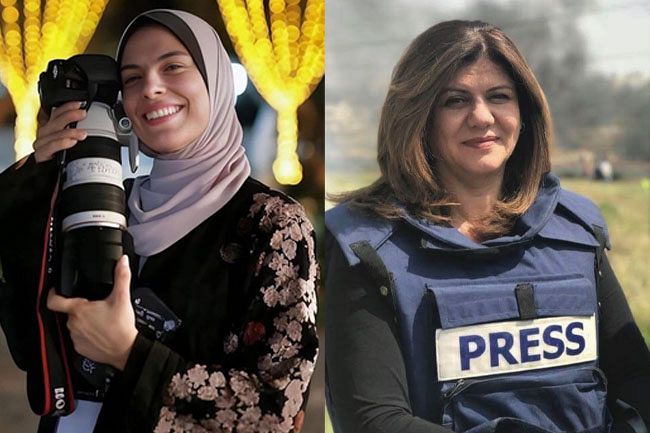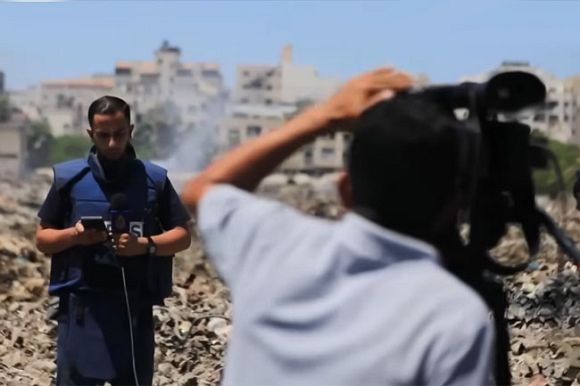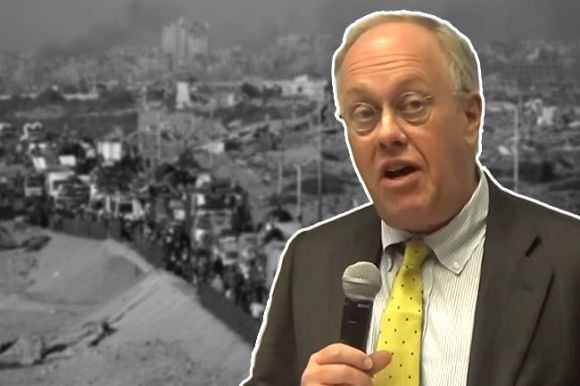From Gaza to Yemen, the world’s frontlines have become execution grounds for truth-tellers, writes Dr John Jiggens.
SUNDAY 2 NOVEMBER was the United Nations International Day to End Impunity for Crimes Against Journalists. Members and friends of the Media Entertainment and Arts Alliance (MEAA) gathered in Brisbane’s Reddacliff Place for a vigil to mourn and remember their colleagues killed on duty, reporting on wars during the past year.
Addressing the vigil, Kasun Ubayasiri, the federal co-vice president of MEAA’s National Media Section, said that the Committee to Protect Journalists (CPJ) has recorded the death of 122 journalists and media workers around the world this year, killed while reporting in combat zones or on dangerous assignments in the previous twelve months.
A staggering 61 of these 122 were Palestinian journalists killed in Israel's war in occupied Gaza. Another 31 media workers were killed in a single day in a targeted Israeli airstrike on a newspaper building in Yemen. Three more were killed in an Israeli airstrike on a compound housing journalists in Lebanon.
All up, Israeli forces were responsible for 95 of the 122 deaths in the past year. The war in Sudan claimed another 13 journalists’ lives, the largest number in Africa. Another 14 media deaths were sprinkled around the many other global conflict zones.
Like the 31 Yemeni deaths, many media workers were deliberately targeted, either at work or at home.
Maher Mughrabi, editor and senior journalist at The Age, spoke about the death of his friend, photographer Fatma Hassona, a Palestinian photojournalist who is the protagonist of Sepideh Farsi’s documentary, Put Your Soul on Your Hand and Walk, killed by an Israeli missile strike in Gaza. She was 25.
In April, days after the photojournalist and ten members of her family were killed in an Israeli airstrike, the Western media reported that Fatma had declared that “If I die, I want a loud death”.
Mughrabi said:
In Western and English language coverage of the Palestinian experience of occupation and apartheid and now genocide, much is lost in translation.
There can be no doubting that the two missiles which entered the Hassuna family's second-floor apartment in Gaza City at about 1 AM on April 16th would have made a deafening noise. But that is not what Fatma meant by loud. Her fellow Gazan, the poet Batul Abu Akhaleen, offered a different translation, “If I must die, I want a resonant death. I want to be neither a newsflash nor a number within a group. I want a death heard by the whole world”.
Fatma wanted her death to make an indelible mark to change things. Anyone who has made the death of a loved one the impetus for a public appeal, or a new charity, or a campaign to change the law, knows this sentiment. Please make my heartbreaking loss into something positive.
The extraordinary photographs Fatma captured with her camera were not just a record of carnage and death, but also of how humans can still walk and work in a space of the worst of humanity.
“I'm trying to find some life in this world, in this death,” she told the Iranian filmmaker Sepideh Farsi.
“Every second you walk in the street, you put your soul on your hand and walk,” she added, giving the documentary that Farsi made about her its title. That film screened in Cannes in May. Fatima was killed the day after being invited to the premiere. Festival organisers remarked that this young woman's life force seemed like a miracle.
Mughrabi continued:
But what force does her death have? Fatma did not want to be a number within a group. And yet the answer to this question is the same for her as it is for the scores of journalists.
I've become afraid of the moment when my brother's blood will reach me, will stain me, Fatma wrote. And she asked, if I die, will all my wishes die with me?
Blood reached Fatima Hassuna in April. But if her death does not resonate, the stain will be ours to bear.
After the vigil remembering our colleagues, we wrote our names and placed flowers on a large banner with the names of all the dead journalists displayed.
This initiative of the MEAA to remember our colleagues was admirable. Israel’s strike on the Yemeni newspaper and the extraordinary number of Palestinian journalists killed in Gaza – often with their families – indicate that Israel regards journalists covering their wars as legitimate targets. However, I was disappointed to see I was one of the few journalists recording this important event.
Israel’s war on Gaza has been the single deadliest conflict for journalists ever. In August 2025, Al Jazeera estimated that more than 270 Palestinian journalists and media workers had been killed in Israel’s war on Gaza — a staggering figure.
According to Brown University’s Costs of War project, more journalists have been killed in Gaza since the war began on 7 October 2023 than in all the wars since the U.S. Civil War, including World War I, World War II, the Korean War, Vietnam War, the wars in the former Yugoslavia and the post-9/11 wars in the Middle East combined.
Australia’s mainstream media remains largely silent about Israel’s targeting of Palestinian journalists and the extraordinary number of our murdered colleagues.
Chris Hedges – one of the giants of contemporary journalism – was in Australia recently to deliver the Edward Said memorial lecture for the Adelaide Friends of Palestine Association (AFOPA). Taking advantage of his presence in Australia, Hedges’ sponsors booked him to appear at the National Press Club (NPC) in Canberra to deliver a speech called The Betrayal of Palestinian Journalists. A date was set for Monday 20 October. Hedges’ speech promised to be an important intervention, highlighting the unprecedented targeting of journalists in Gaza.
However, three weeks before Hedges’ address, out of the blue, the Press Club cancelled his speech in the interest, they said, of balancing their program. Apparently, persons unknown worried that the NPC coverage of Israel and Gaza was becoming “unbalanced”. In the wake of Antoinette Lattouf’s dismissal from the ABC, rumours spread that the powerful Israel lobby had intervened. Proving Hedges’ charge, the cancellation of his speech confirmed the NPC’s betrayal of Palestinian journalists.
Hedges’ supporters arranged another platform, an interview with David Marr, the anchor of the ABC’s Late Night Live program. Marr, a former host of Media Watch, disgraced himself, scolding Hedges for associating with AFOPA and trying to school one of the world’s great journalists for his alleged sins against the ABC journalism stylebook, bothsidesism.
A key point in their dispute came in the discussion of the Israel Defence Forces’ denial of their assassination of the Palestinian journalist, Shireen Abu Akleh. Marr asserted the central doctrine of ABC journalism — bothsideism.
“Now, whether we like it or not,” Marr told Hedges, “as journalists, we have to report the excuses made by outfits like the IDF, don't we? We have to report their explanations. That's our job.”
“No,” countered Chris Hedges: “Our job is to report the truth.”
While Israel has forbidden Western journalists from entering Gaza to observe the war, the only journalists reporting from the war zone are Palestinians, and they are being targeted and slaughtered on a massive scale. Secure from the horrors of war, ensconced in comfortable hotels in Jerusalem, their Western colleagues receive background briefings from the IDF and write their reports.
They repeat Israeli lies, which they know are lies, said Chris Hedges:
“By amplifying Israeli lies, they're discrediting the work of my colleagues in Gaza.”
Before our eyes, a genocide that the Australian mainstream media refuses to name unfolds. While Palestinian journalists reporting the war are murdered on an industrial scale, Australian journalists, excluded from the war zone, claim to report both sides, the truth they can not see and the lies they are told.
Dr John Jiggens is a writer and journalist currently working in the community newsroom at Bay-FM in Byron Bay.
 This work is licensed under a Creative Commons Attribution-NonCommercial-NoDerivs 3.0 Australia License
This work is licensed under a Creative Commons Attribution-NonCommercial-NoDerivs 3.0 Australia License
Support independent journalism Subscribe to IA.

Related Articles
- Weaponising words: How propaganda shapes Gaza narratives
- Trump's peace plan might split two states into three
- Fighting Australia’s complicity in genocide — we’ve been here before
- Gaza’s children bear the hidden cost of war
- Palestinian women bear brunt of Gaza war while leading community resilience














